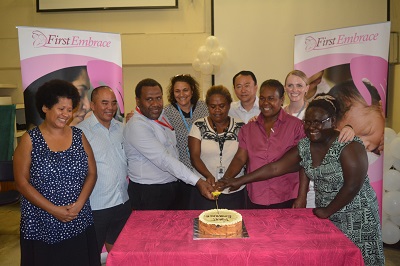The Ministry of Health and Medical Services (MHMS) today launched the Early Essential Newborn Care (EENC) package at the National Referral Hospital in an effort to save newborn babies’ lives.
EENC is a package of actions and interventions that address the most common causes of newborn death or disease, such as prematurity (being born too soon), low birth weight and severe infection.
In the Solomon Islands, 44% of all deaths of children under five years of age are in the first 28 days of life or the newborn period.
‘In the Solomon Islands we are losing too many newborn babies, and many of these deaths can be prevented with a few simple and cost-effective actions, including the First Embrace,’ said MHMS Permanent Secretary Dr Tenneth Dalipanda.

"Dr Chris Becha, Under Secretary of Health Improvement, Ministry of Health and Medical Services, together with health workers and stakeholders launch Early Essential Newborn Care (EENC) in the Solomon Islands.”
‘The First Embrace is 90 minutes of sustained skin-to-skin contact between the mother and newborn immediately after birth. This simple act transfers warmth, promotes exclusive breastfeeding and decreases risk of infection in the newborn,’ said MHMS National Newborn Health Program Coordinator Mrs Anna Jatobatu.
‘The MHMS is calling on mothers and fathers, health workers, policymakers and civil society to support and spread the word about the importance of the First Embrace,’ said Dr Dalipanda.
Early Essential Newborn Care also includes immediate and thorough drying of the newborn, health worker hand hygiene, delayed cord clamping and resuscitation for the non-breathing baby.
‘The World Health Organization is proud to have supported the MHMS to train over 350 health care workers in EENC this year and looks forward to working with the MHMS to roll EENC out to the provinces in 2016,’ said Dr Audrey Aumua, WHO Representative in Solomon Islands.
The MHMS Reproductive Child Health Division established the Newborn Health Program in early 2015 to address the disproportionate number of newborn deaths. EENC was developed by the World Health Organization (WHO) to save newborn lives, and prevent complications from unsafe practices in newborn care. In 2015, the MHMS commenced EENC implementation with technical support from WHO.

/59748.tmb-300v.png?sfvrsn=9885965b_2)


